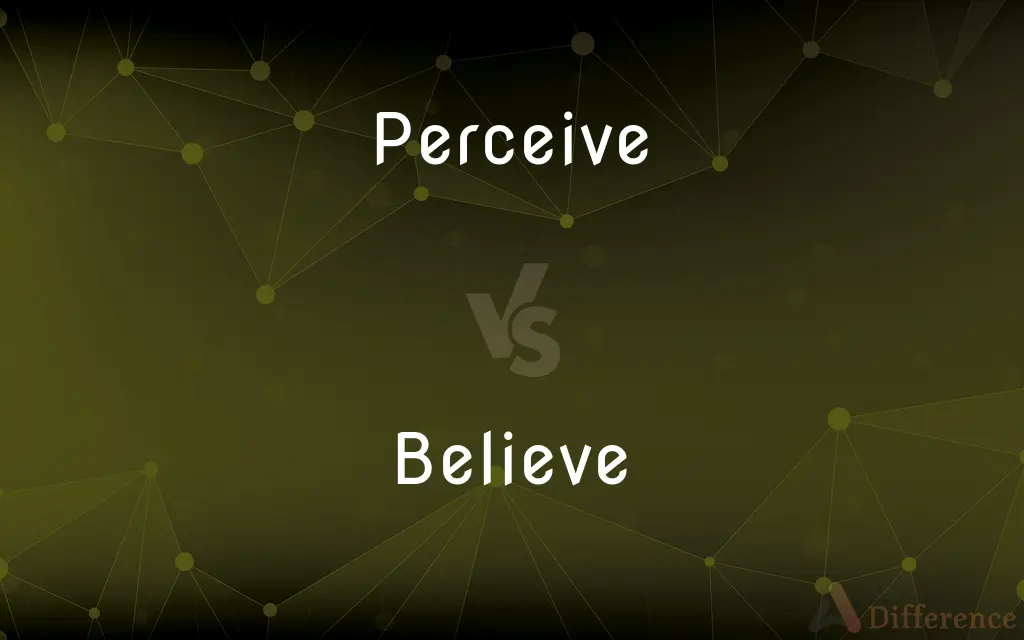Perceive vs. Believe — What's the Difference?
By Tayyaba Rehman & Urooj Arif — Updated on April 16, 2024
Perceive involves directly sensing or understanding something through the senses, while believe entails accepting something as true, often based on thoughts or feelings rather than direct evidence.

Difference Between Perceive and Believe
Table of Contents
ADVERTISEMENT
Key Differences
Perceiving is the act of becoming aware of something through the senses, such as sight, hearing, or touch, enabling immediate or direct understanding of the external environment. In contrast, believing is a cognitive process where individuals accept the truth or existence of something, often without sensory proof.
Perception is influenced by sensory input and can be verified through empirical evidence, as it is directly linked to how we interpret the physical world. Whereas, belief is influenced by personal conviction, cultural background, or external teachings, and does not necessarily require sensory evidence.
Individuals perceive objects, events, or situations as they occur, relying on their sensory organs to gather information. On the other hand, belief can be held about things not currently present or observable, such as concepts or future events.
Perceptions can change with new sensory information or alterations in the environment, highlighting their dynamic and adaptable nature. Conversely, beliefs can be deeply ingrained and may persist even in the absence of supporting sensory data or despite contradictory evidence.
While perception deals with immediate and real-time data from the environment, belief extends into the realms of faith, trust, and assumption, covering areas beyond immediate sensory experiences.
ADVERTISEMENT
Comparison Chart
Basis
Sensory information and experience
Conviction, faith, or assumption
Verification
Through direct sensory experience
Often lacks direct sensory confirmation
Influence Factors
Sensory organs, physical presence
Culture, education, emotions
Temporality
Immediate and present
Can be past, present, or future
Flexibility
Adaptable with new information
May persist despite new information
Compare with Definitions
Perceive
To interpret sensory information and make sense of the environment.
He perceived a threat in the otherwise calm scenario.
Believe
To feel confident about the truth of something.
I believe you are making the right decision.
Perceive
To grasp mentally; comprehend.
It’s important to perceive the implications of your actions.
Believe
To accept something as true, especially without proof.
She believes in the power of positive thinking.
Perceive
To notice or become conscious of something.
We often perceive changes in weather intuitively.
Believe
To trust or have confidence in someone or something.
She believes in her team's abilities.
Perceive
To understand or think of something in a particular way.
Children perceive the world differently from adults.
Believe
To have faith, particularly in a religious context.
He believes strongly in his faith.
Perceive
To become aware of something through the senses.
She could perceive the faint sound of music in the distance.
Believe
To hold an opinion; think or suppose.
They believe that the project will be completed on time.
Perceive
Become aware or conscious of (something); come to realize or understand
He was quick to perceive that there was little future in such arguments
His mouth fell open as he perceived the truth
Believe
Accept that (something) is true, especially without proof
The superintendent believed Lancaster's story
Some 23 per cent believe that smoking keeps down weight
Perceive
Interpret or regard (someone or something) in a particular way
If Guy does not perceive himself as disabled, nobody else should
Some geographers perceive hydrology to be a separate field of scientific enquiry
Believe
Hold (something) as an opinion; think
I believe we've already met
Four men were believed to be trapped
Perceive
To become aware of (something) directly through any of the senses, especially sight or hearing
We could perceive three figures in the fog.
Believe
To accept (something) as true or real
Do you believe his version of what happened?.
Perceive
To cause or allow the mind to become aware of (a stimulus)
The ear perceives sounds.
Believe
To consider (someone) to be truthful or accurate in what they are saying
I believe you when you say that your neighbor is angry.
Perceive
To achieve understanding of; apprehend
Einstein perceived that energy and matter are equivalent. ].
Believe
To expect or suppose; think
I believe it will snow tomorrow. I believe the letters to be authentic.
Perceive
(transitive) To become aware of, through the physical senses, to see; to understand.
Believe
To have religious faith
He believes in God.
Perceive
To interpret something in a particular way
John was perceived to be a coward by his comrades
Believe
To have faith, confidence, or trust
I believe in your ability to solve the problem.
Perceive
To obtain knowledge of through the senses; to receive impressions from by means of the bodily organs; to take cognizance of the existence, character, or identity of, by means of the senses; to see, hear, or feel; as, to perceive a distant ship; to perceive a discord.
Believe
To consider something to be important, worthwhile, or valuable
I believe in free speech.
Perceive
To take intellectual cognizance of; to apprehend by the mind; to be convinced of by direct intuition; to note; to remark; to discern; to see; to understand.
Jesus perceived their wickedness.
You may, fair lady,Perceive I speak sincerely.
Till we ourselves see it with our own eyes, and perceive it by our own understandings, we are still in the dark.
Believe
(transitive) To accept as true, particularly without absolute certainty (i.e., as opposed to knowing).
If you believe the numbers, you'll agree we need change.
I believe there are faeries.
Perceive
To be affected of influented by.
The upper regions of the air perceive the collection of the matter of tempests before the air here below.
Believe
(transitive) To accept that someone is telling the truth.
Why did I ever believe you?
Perceive
To become aware of through the senses;
I could perceive the ship coming over the horizon
Believe
(intransitive) To have religious faith; to believe in a greater truth.
After that night in the church, I believed.
Perceive
Become conscious of;
She finally perceived the futility of her protest
Believe
To opine, think, reckon.
Do you think this is good? —Hmm, I believe it's okay.
Believe
To exercise belief in; to credit upon the authority or testimony of another; to be persuaded of the truth of, upon evidence furnished by reasons, arguments, and deductions of the mind, or by circumstances other than personal knowledge; to regard or accept as true; to place confidence in; to think; to consider; as, to believe a person, a statement, or a doctrine.
Our conqueror (whom I nowOf force believe almighty).
King Agrippa, believest thou the prophets ?
Often followed by a dependent clause.I believe that Jesus Christ is the Son of God.
Believe
To have a firm persuasion, esp. of the truths of religion; to have a persuasion approaching to certainty; to exercise belief or faith.
Lord, I believe; help thou mine unbelief.
With the heart man believeth unto righteousness.
Believe
To think; to suppose.
I will not believe so meanly of you.
Believe
Accept as true; take to be true;
I believed his report
We didn't believe his stories from the War
She believes in spirits
Believe
Judge or regard; look upon; judge;
I think he is very smart
I believe her to be very smart
I think that he is her boyfriend
The racist conceives such people to be inferior
Believe
Be confident about something;
I believe that he will come back from the war
Believe
Follow a credo; have a faith; be a believer;
When you hear his sermons, you will be able to believe, too
Believe
Credit with veracity;
You cannot believe this man
Should we believe a publication like the National Inquirer?
Common Curiosities
How does belief differ from knowledge?
Belief does not require empirical evidence, while knowledge typically involves evidence and truth.
How do perceptions influence behavior?
Perceptions directly influence how individuals react to their environment, guiding responses and actions.
What does it mean to perceive something?
To perceive means to become aware of or understand something through the senses.
What role does perception play in communication?
Perception plays a crucial role in how messages are interpreted and understood in communication.
How are perceptions formed?
Perceptions are formed through sensory processes and cognitive interpretations of sensory data.
Can someone’s beliefs change?
Yes, beliefs can change with new information, experiences, or insights.
Is believing always a conscious choice?
Believing can be both a conscious choice and a subconscious acceptance influenced by various factors.
What causes people to change their beliefs?
Changes in beliefs can occur due to new experiences, evidence, or persuasive arguments.
How do cultures influence beliefs?
Cultures shape beliefs through shared values, practices, and norms taught from generation to generation.
Can perceptions be wrong?
Yes, perceptions can be inaccurate due to faulty sensory input or misinterpretations.
Why do people believe in things without evidence?
Beliefs can be based on faith, cultural teachings, or personal experiences, which do not always require empirical evidence.
What is the relationship between belief and attitude?
Beliefs help form attitudes, which are predispositions to respond in a certain way to things or people.
Are beliefs always based on religion?
No, beliefs can be secular or non-religious, such as beliefs in concepts like justice or freedom.
Can perception influence belief?
Yes, perceptions can influence beliefs by providing sensory evidence that supports or contradicts them.
Why is it important to understand both perception and belief?
Understanding both helps in comprehending human behavior and interactions, facilitating better communication and empathy.
Share Your Discovery

Previous Comparison
Fraternize vs. Fraternise
Next Comparison
Czar vs. TsarAuthor Spotlight
Written by
Tayyaba RehmanTayyaba Rehman is a distinguished writer, currently serving as a primary contributor to askdifference.com. As a researcher in semantics and etymology, Tayyaba's passion for the complexity of languages and their distinctions has found a perfect home on the platform. Tayyaba delves into the intricacies of language, distinguishing between commonly confused words and phrases, thereby providing clarity for readers worldwide.
Co-written by
Urooj ArifUrooj is a skilled content writer at Ask Difference, known for her exceptional ability to simplify complex topics into engaging and informative content. With a passion for research and a flair for clear, concise writing, she consistently delivers articles that resonate with our diverse audience.













































